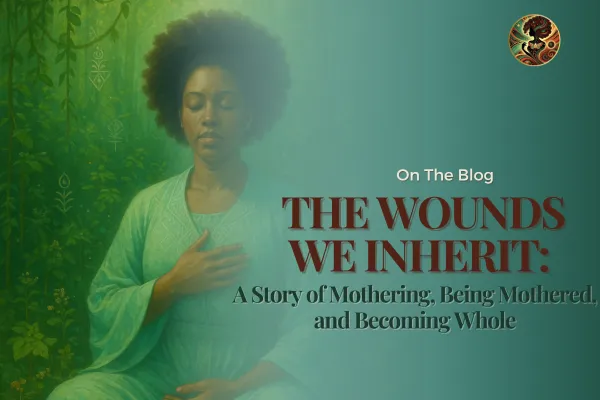
The Wounds We Inherit: A Story of Mothering, Being Mothered, and Becoming Whole
The Wounds We Inherit: A Story of Mothering, Being Mothered, and Becoming Whole
By Melissa Ifill
There are things I know about my mother, and there are things I’ve had to piece together—through memories, stories, and the silence between them.
Her name was Joye Delph Ifill. Born April 8th, 1950. A loving, caring, vibrant woman. A daddy’s girl with a big heart and a quiet ache that she rarely named. She came from a deeply religious Pilgrim Holiness household in Guyana, a world steeped in tradition, structure, and sanctified expectations. But my mother? She had a spark—rebellious, radiant, soft, and strong all at once. She was a woman who wanted to be free.
And yet, she wanted to belong. Two seemingly opposing desires, without a clear path for how to live inside both truths. The freedom to be herself. The longing to feel rooted.
She shared once that she never felt truly seen by her own mother. That truth stayed with me—because even as she gave her life in love and service to her family, even as people mourned her with deep affection when she passed, my mother confessed to always feeling lonely. Misunderstood. Like there was something in her—some essential truth—no one ever fully grasped. Like there was always a life she wanted just outside of her grip.
That... wrecked me. Because I knew—know—that I, too, didn’t always understand her. I wanted her to be different. And sometimes, I resented her for who she was.
Because in her story, I see echoes of my own.
I’ve known what it means to be deeply loved and deeply alone. To be surrounded and still feel like no one quite gets the full picture. And like her, I’ve often made space for others to feel seen, trying to mother the world—clients, friends, kin—sometimes before learning how to consistently mother myself.
As I reflect on my own journey, and hers, I now understand that mothering is not just about raising children. It’s about the ways we show up to hold, nurture, witness, and affirm. It’s about how we carry others—and how we sometimes forget to carry ourselves.
But here’s the truth: there are wounds in the caring.
Wounds from being mothered by women who were doing the best they could with what they had, but still left us with unmet needs. Wounds from trying to be the strong one, the fixer, the “matriarch” before we were fully grown. Wounds from believing love meant sacrifice instead of mutual nourishment. Wounds from realizing we sometimes hurt others when our only intention was to help or heal.
I’ve been reading Matriarch by Tina Knowles. She reminds us that every woman has the potential to embody that title—not just those with children. But what we don’t talk about enough is the emotional weight we bring into our roles, shaped by past pain. The ego stories we build around being needed. The exhaustion of overextending. The fear of being too much and not enough.
My mother lived that story. And for a long time, so did I.
Hell, sometimes I still do.
But healing begins with truth.
Self-mothering, for me, has become the sacred act of choosing myself. Of letting go of the belief that I must earn rest. That my needs are too big. That I have to be everything for everyone to be worthy of care. That I have to get caring “right” all the time for all to be well.
Sometimes that belief still sneaks in, whispering that if I don't hold everything together, things might fall apart. But the truth is: I’m allowed to rest. I’m allowed to let things go.
It’s giving myself what I used to wish someone else would give me first: patience, protection, praise, peace.
It is grieving what I didn’t get and what I don't have to give. And forgiving—not just my mother—but the systems and silences that shaped us both.
And still, I honor her. I honor me.
I honor our joy. Our survival. Our attempt to love with an overflowing, aching heart.
I know now that she, too, was navigating her own ego stories—ones about being needed, about disappearing to make others feel whole.
And I know I am not alone.
So many of us are walking around with quiet aches. Wondering how to mother without resentment. How to forgive without forgetting. How to heal without bypassing the truth. And how to write new stories—ones that hold both the grief and the grace.
This is my invitation to you:
Reflect on who mothered you. What were their wounds? What did they model?
Reflect on who you’ve mothered—by choice or by default. What did it cost you?
And finally, reflect on how you might mother yourself—not just with discipline, but with delight.
You are allowed to be your own safe place.
You are allowed to hold complexity.
To say: “I love my mother.”
And also: “I needed more.”
To say: "I mothered you with my best."
And also: "My best may not have given you everything you needed."
You are allowed to be the mothered and the mother.
Both the daughter and healer.
Both the seed and the soil.
---
I'd love to hear from you:
What is one thing you wish your mother had said to you? What is one thing you wish you could say freely to those you mother(ed)? What does your inner child need now, and how can you lovingly offer it?
